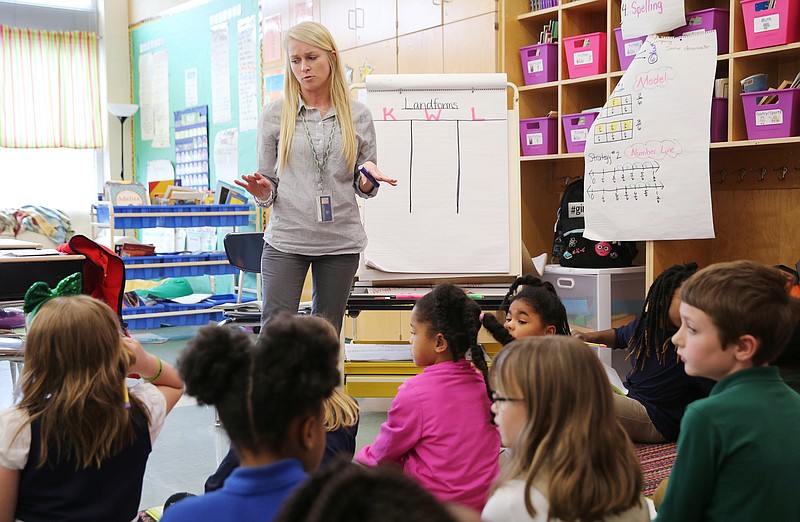With 20 little heads peering up at her from where the third-graders sat with folders and lined paper in their laps, Christin Willingham filled out a chart in purple marker.
"Who can tell me something they learned about landforms today?" Willingham asked the class. Hands raised and bodies strained as students tried to get chosen to provide their answer from the corner of a classroom at Battle Academy in downtown Chattanooga.
Off to the side watching was the classroom's lead teacher, Wendy Scruggs, a 14-year veteran of the elementary school.
Willingham is a University of Tennessee at Chattanooga student who is completing her undergraduate student teaching residency, required to obtain her degree. She is one of the 20 UTC teacher candidates that are part of a pilot group this school year, as the School of Education extends its traditional student teacher experience to a one-year residency model. The model, which includes a part-time residency starting at the beginning of the school year and a full-time residency, will be officially rolled out for all teacher candidates in the fall.
"The residency ensures that students have the opportunity to be in the classroom learning about what the expectations of being a teacher will be," said Renee Murley, director of the School of Education at UTC. "It helps us ensure that we are ready on day one and it helps us ensure that what we're teaching in the classroom aligns with what's happening in the field."
Previously, teacher candidates spent just their last semester working full time in a classroom, which meant that student teachers who completed their requirement in the spring would join a classroom halfway through the school year.
"It's so important that our teacher candidates are there for the first day of school," said Kendra Duncan, teacher education program coordinator at UTC, who supervises, evaluates and helps place student teacher candidates with mentor teachers specifically selected at partner schools. "They are siting right alongside their [mentor], during preservice professional development days, so they understand all of the duties of a professional educator."
Willingham spent two days a week in Scruggs' classroom during the fall and currently spends the entire school day alongside her mentor. The pair were trained on co-teaching strategies and she has slowly taken over responsibilities, now leading reading, science and social studies lessons daily.
"She has grown tremendously," Scruggs said. "I introduced her as my partner from day one. [The students] give her the same respect they give me. Kids respect who you respect."
Nationally, the trend has seen educator preparation programs moving toward longer residency experiences. Some of Tennessee's most highly rated preparation programs are alternatives to traditional university-based programs, such as Teach for America and Nashville and Memphis' teacher residency programs.
The University of Tennessee at Knoxville added a fifth-year internship to its educator preparation programs in the 1980s. Except for some secondary math, science and early childhood/special education candidates, all of UT-Knoxville's education students spend an entire year in a local classroom.
"Our internship program has been well-regarded," said Sherry Bell, acting dean for UT's College of Education, Health, and Human Sciences. "Clinical experience is really important to us, and we work really carefully on our placements. I do think that UTC will see some improvements for implementing that model because of what I know about others than have been successful."
In 2016, the State Board of Education launched a new educator preparation report card, as well as a network of educator preparation providers to work collaboratively to raise the quality of teachers across the state. The State Collaborative on Reforming Education also issued a list of recommendations that same year, which included strengthening classroom-based experiences for teacher candidates, increasing collaboration between preparation programs and school districts and enhancing the diversity of the teaching population.
Murley, who took the helm that same summer, immediately began working to strengthen UTC's program. The university supplies the bulk of the 300 or so teachers hired by the Hamilton County Department of Education annually and historically had done a poor job of preparing its teacher candidates.
In the latest report card released last month, UTC still lagged behind other programs in the state, receiving a score of 2 out of 4 - an aggregate of 40 possible scores based on categories including the program's overall performance, the profiles of graduates and their performance once they were employed.
However, the new teacher residency model is only one of the key pieces that Murley believes will help strengthen the program and prepare teachers for the classroom.
"The partnership role with those primary partner districts is vital. We are able to listen and think about what is it we need to be doing in those teacher prep courses and in the pedagogy to make sure they are prepared," she said. "We're hoping that builds that bridge between educator preparation and school districts."
Murley has been working toward other changes to UTC's program, as well - a new dual K-5 certification and English as a second language degree program was approved Friday by the Faculty Senate and work is underway to revamp of the school's partnership agreement with the Hamilton County Department of Education.
"For us, that was a direct response to our partner districts it addresses the teacher pipeline that I think was a concern for all of us [in the region]. And I think that's what our role is, to meet the needs of the districts we serve," Murley said.
For Willingham, who hopes to teach in her hometown in Catoosa County, Ga., after she graduates in May, she feels the program has prepared her for the classroom.
"Everything UTC has taught me in classes, I've used," she said. Her relationship with Scruggs and the training they've both received on co-teaching strategies, as well as how to communicate best practices and assist each other have been the most helpful.
"I think that's the best thing," Willingham said. "That's what mentors' roles are - to make sure we are successful."
Contact staff writer Meghan Mangrum at mmangrum@timesfreepress.com or 423-757-6592. Follow her on Twitter @memangrum.

